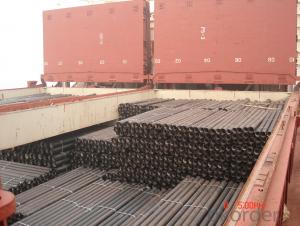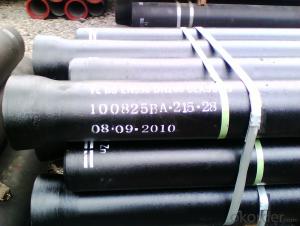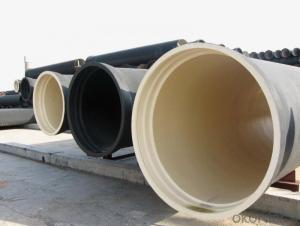Ductile Iron Pipe ISO2531:1998 C CLASS DN400
- Loading Port:
- China main port
- Payment Terms:
- TT or LC
- Min Order Qty:
- 20 m.t.
- Supply Capability:
- 200000 m.t./month
OKorder Service Pledge
OKorder Financial Service
You Might Also Like
1.Ductile Iron Pipe Description :
1) Pipes confirm to ISO2531,K9 class,T type joint,6m long,with inside cements lining conform to ISO4179, outside Zinc
spraying(130g/m2) and bitumen coating(70μm) conform to ISO8179.
2) Pipe ends: Spigot and socket ends, with 100% SBR rubber gaskets accoding to ISO4633
3) we can do third party inspection according to customer's request.
2.Main Features of the Ductile Iron Pipe:
1).Quality guarantee
• Chemical checking
• NDE after rough machining
• Mechanical testing after heat treatment
• Final NDE,dimension inspected
2).Quality document
• Full Q.A document as per client request
3).Packing and Shipping
• standard export package(carton/wooden case/pallet)
• accept FOB,FAS,CNF,CIF door to door etc or customer designated shipping agent
1. Material: Ductile iron grade 500-7/ 450-10 in accordance with ISO1083
2. Standard: ISO 2531, EN545, EN598, ANSI, AWWA
3. Certificate: ISO9001, ISO14001, SGS, NSF, WRAS
4. Test: In accordance with ISO 2531 / EN 545 / EN598 and 100% water pressure test
5. Length: 6m or cut into 5.6m, 5.7m, 5.8m
3.Ductile Iron Pipe Images:
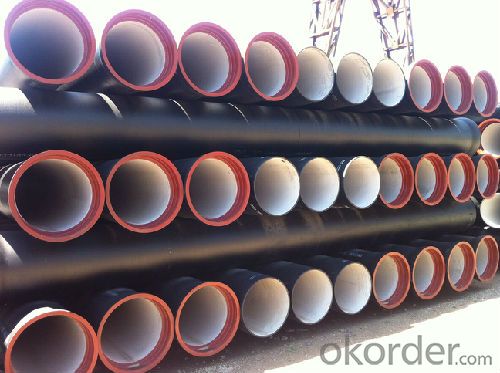
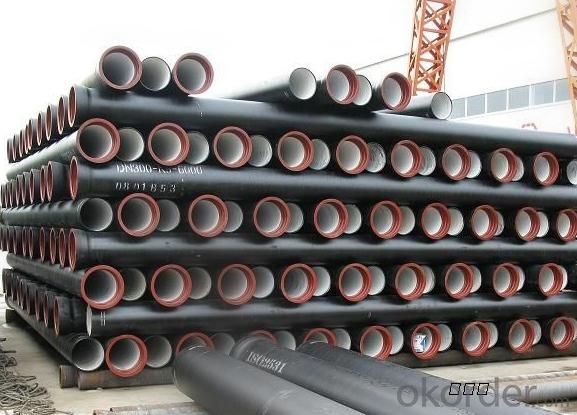
4.Ductile Iron Pipe Specification:
Internal lining: ductile iron pipes shall have an internal cement mortar lining in acc with ISO4179.
External coating: ductile iron pipes shall be externally coated with metallic zinc spray plus a further layer of resin
painting to ISO8179.
Gasket: 100% SBR/NBR/EPDM rubber gasket in accordance with ISO4633.
Packing: ductile iron pipes from DN100 to DN300 be bundled with steel belts, others are in bulk.
Payment term: L/C, T/T.
Packing: In bulk vessel or in container
5.FAQ:
We have organized several common questions for our clients,may help you sincerely:
1.Q: Why would you choose ductile iron pipe rather than other pipe materials?
A:The reasons are obvious for that not only ductile iron pipe possesses the inherent strength and flexibility of ductile
iron, combined with proven corrosion protection systems, but also the cost savings can be achieved from design to
installation and commissioning.
2.Q:Why can you guarantee the inner of pipes can’t be corroded?
A: High alumina cement mortar lining and sulphate-resistant cement mortar lining. These two special linings are applicable
to inner anti-corrosion for sewage pipes, improving resistance to erosion of the sewage components.
- Q:Can ductile iron pipe be used for road and highway crossings?
- Yes, ductile iron pipe can be used for road and highway crossings. Ductile iron is a strong and durable material that is well-suited for underground infrastructure projects, including road and highway crossings. It provides excellent resistance to heavy loads, corrosion, and external forces, making it suitable for withstanding the traffic and environmental conditions associated with road and highway crossings. Additionally, ductile iron pipe is available in various sizes and strengths, allowing for customization based on the specific requirements of the crossing. Proper installation techniques and adherence to relevant industry standards are essential to ensure the longevity and performance of ductile iron pipes in road and highway crossings.
- Q:What are the typical joint sealing requirements for ductile iron pipes?
- The typical joint sealing requirements for ductile iron pipes include using rubber gaskets or O-rings to create a watertight seal between pipe sections. Additionally, mechanical joint restraints are often used to prevent joint separation under pressure.
- Q:How are ductile iron pipes tested for quality?
- Various methods are employed to test the quality of ductile iron pipes, ensuring they meet required standards and specifications. One commonly used test is the hydrostatic pressure test, wherein the pipes are subjected to high-pressure water or other liquids to detect leaks or weaknesses. Water is typically used to fill the pipes, with the pressure gradually increased to a predetermined level. This test effectively identifies potential defects that could compromise the pipes' integrity. Another important quality test for ductile iron pipes is the tensile test. This involves pulling a sample of the pipe until it breaks, measuring the applied force and elongation. By doing so, the pipe's tensile strength and ductility can be determined, ensuring it can withstand required loads and stresses without deformation or failure. In addition to these tests, other quality checks include visual inspection, dimensional checks, and surface defect examinations. Visual inspection involves scrutinizing the pipes for visible defects like cracks, voids, or surface irregularities. Dimensional checks ensure the pipes meet specified dimensions and tolerances. Furthermore, ductile iron pipes often undergo corrosion resistance tests. This entails exposing the pipes to corrosive environments such as saltwater or acidic solutions to evaluate their resistance to corrosion. This is vital in determining the pipes' durability and longevity, particularly in harsh conditions. Overall, ductile iron pipes undergo rigorous testing to ensure their quality and performance. These tests guarantee that the pipes meet required standards, are safe for use, and can withstand anticipated loads and environmental conditions in their intended applications.
- Q:How do ductile iron pipes handle water hammer in high-rise buildings?
- Known for their durability and strength, ductile iron pipes are an excellent option for managing water hammer in high-rise structures. Water hammer, a common occurrence when water flow abruptly halts or changes direction in pipes, causes pressure surges that can strain and potentially harm the pipes. Engineered to withstand high-pressure scenarios, ductile iron pipes exhibit remarkable resistance to water hammer. With their high tensile strength, these pipes can endure sudden pressure changes without warping or fracturing. This feature is especially crucial in high-rise constructions where water distribution must accommodate various floor pressures. Furthermore, the outstanding corrosion resistance of ductile iron pipes bolsters their ability to handle water hammer. Over time, corrosion weakens pipes, making them more prone to failure during pressure surges. However, the corrosion resistance of ductile iron pipes guarantees their structural integrity even in high-pressure circumstances. Moreover, the flexibility of ductile iron pipes enables them to absorb and dissipate the energy generated by water hammer. Consequently, the overall system experiences minimal impact, reducing the potential for damage. Absorbing energy also contributes to minimizing noise and vibrations associated with water hammer, thus enhancing the efficiency and comfort of the water supply system. To summarize, ductile iron pipes are well-suited to manage water hammer in high-rise buildings. Their strength, corrosion resistance, and flexibility make them a reliable choice for delivering water under varying pressures while upholding the system's integrity.
- Q:Can ductile iron pipes be used for underground hydropower systems?
- Yes, ductile iron pipes can be used for underground hydropower systems. Ductile iron pipes are known for their strength and durability, making them suitable for various applications, including underground installations. They have excellent resistance to corrosion and can withstand high pressure, making them ideal for carrying water in hydropower systems. Ductile iron pipes also have a long lifespan, reducing the need for frequent replacements and minimizing maintenance costs. Additionally, they have good joint integrity, ensuring leak-free connections underground. Therefore, ductile iron pipes are a reliable choice for underground hydropower systems.
- Q:How do ductile iron pipes handle ground settlement?
- Due to their inherent flexibility and resistance to deformation, ductile iron pipes are highly effective in managing ground settlement. The exceptional qualities of ductile iron, such as its high tensile strength and elongation capacity, make it an ideal material for enduring ground movement. When ground settlement occurs, characterized by the downward shifting of soil or sediment, ductile iron pipes possess the capability to flex and adapt to the changing ground without fracturing. The pipes can absorb the stress caused by settlement and evenly distribute it along their length, minimizing the likelihood of cracks or breaks. Moreover, ductile iron pipes are constructed with a bell and spigot joint system, which permits slight movement and rotation at the joints. This characteristic allows the pipes to accommodate ground settlement by absorbing any misalignment or shifting of the surrounding soil. Furthermore, ductile iron pipes exhibit a greater load-bearing capacity than alternative materials like PVC or HDPE. This implies that they can endure heavier loads and pressures from the surrounding soil, reducing the possibility of pipe failure or collapse during ground settlement. In conclusion, ductile iron pipes are excellently equipped to handle ground settlement due to their flexibility, resistance to deformation, and ability to evenly distribute stress. Their unique properties ensure their ability to withstand the challenges presented by shifting ground conditions, making them a dependable choice for underground infrastructure projects.
- Q:Are ductile iron pipes suitable for gravity flow applications?
- Yes, ductile iron pipes are suitable for gravity flow applications. Ductile iron is a strong and durable material that can withstand the weight of the water and solid waste flowing through the pipes without any issues. It has high tensile strength and can resist damage from external forces such as soil movement or heavy traffic loads. Additionally, ductile iron pipes have smooth inner surfaces that promote efficient flow and minimize friction losses. They are also resistant to corrosion and can last for decades without requiring frequent maintenance or replacement. Overall, ductile iron pipes are a reliable choice for gravity flow applications due to their strength, durability, and resistance to various environmental factors.
- Q:What is the expected sound attenuation of ductile iron pipes?
- Several factors can affect the expected sound attenuation of ductile iron pipes. Generally, these pipes have good sound attenuation properties due to their dense construction and thick walls. The density of the material helps absorb and dampen sound waves, reducing noise transmission. Additionally, the thickness of the pipe walls adds an extra barrier for sound to pass through, contributing to sound attenuation. However, it's important to consider other factors that can influence the specific sound attenuation of ductile iron pipes. These factors include pipe diameter, wall thickness, installation method, and the surrounding environment. For example, larger diameter pipes may have slightly lower sound attenuation compared to smaller diameter pipes due to their increased surface area. Additionally, variations in wall thickness can affect the sound insulation properties. During installation, the presence of joints or fittings in the pipeline can create points where sound can transmit, reducing sound attenuation. Therefore, it is recommended to use proper installation techniques that minimize the use of joints and fittings to enhance sound attenuation. The surrounding environment also plays a role in sound attenuation. For instance, if the pipes are buried in soil, the composition and density of the soil can affect sound transmission properties. Moreover, the presence of other structures or materials nearby may influence the overall sound attenuation performance. To determine the specific expected sound attenuation of ductile iron pipes for a particular application, it is advisable to consult manufacturer specifications or seek assistance from acoustic engineering professionals. They can consider all relevant factors and conduct specific tests or simulations to provide accurate predictions.
- Q:What is the expected sound transmission loss of ductile iron pipes?
- The expected sound transmission loss of ductile iron pipes can vary depending on various factors such as pipe thickness, diameter, and installation conditions. However, ductile iron pipes are generally known for their good acoustic performance and can provide significant sound reduction, especially compared to other types of pipes like PVC or cast iron.
- Q:What are the specifications of cast iron pipes?
- To be divided into: cast cast pipe. Cast iron pipes are used for water supply, drainage and gas transmission lines. They include cast iron pipes and pipe fittings. Labor intensity is small. According to the casting method, it is divided into continuous cast iron pipe and centrifugal cast iron pipe, in which the centrifugal cast iron pipe is divided into sand mould and metal type two kinds. Divided into gray cast iron pipe and nodular cast iron pipe according to different material. Rubber ring seals for flexible interfaces,
1. Manufacturer Overview |
|
|---|---|
| Location | |
| Year Established | |
| Annual Output Value | |
| Main Markets | |
| Company Certifications | |
2. Manufacturer Certificates |
|
|---|---|
| a) Certification Name | |
| Range | |
| Reference | |
| Validity Period | |
3. Manufacturer Capability |
|
|---|---|
| a)Trade Capacity | |
| Nearest Port | |
| Export Percentage | |
| No.of Employees in Trade Department | |
| Language Spoken: | |
| b)Factory Information | |
| Factory Size: | |
| No. of Production Lines | |
| Contract Manufacturing | |
| Product Price Range | |
Send your message to us
Ductile Iron Pipe ISO2531:1998 C CLASS DN400
- Loading Port:
- China main port
- Payment Terms:
- TT or LC
- Min Order Qty:
- 20 m.t.
- Supply Capability:
- 200000 m.t./month
OKorder Service Pledge
OKorder Financial Service
Similar products
New products
Hot products
Related keywords
